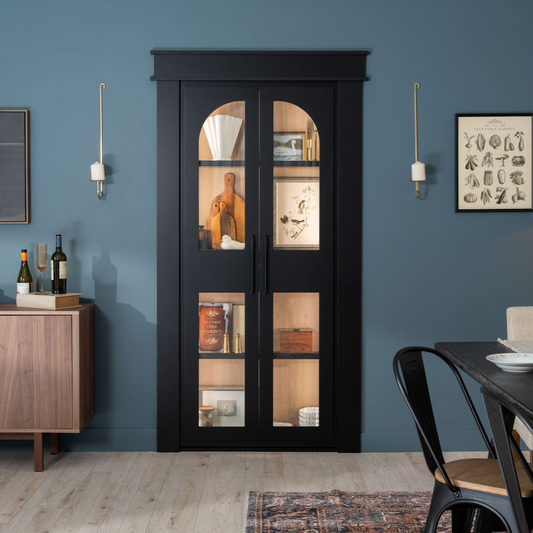Being a homeowner means you have both the freedom and responsibility to do your own home maintenance. You can build custom doors and furniture, and you can choose how to keep your home in good order. That being said, regular home maintenance and the occasional DIY repair require a collection of specific tools. Home maintenance and even minor renovation is something everyone can learn. Over time, you'll put together the tools needed for the variety of annual tasks. From tuning up the dryer to installing a new door, the right tools can allow you to do small home repairs quickly with good quality.
Instead of accumulating your tool kit over a few years of last-minute trips to the hardware store, the Murphy Door team is happy to share our complete list of home maintenance tools from our extensive experience with DIY homeowners. With the right tools, you can quickly tackle any home maintenance or home improvement project. Let's dive into the tool kit essentials for DIY homeowners.
1. Screwdriver Set — Flathead and Phillips
- Slot — Flathead Screwdrivers
- Phillips — Cross Screwdrivers
- Allen Wrench Set
Always start with a good set of screwdrivers. If you've taken apart or assembled a few items, then you know that not all screws are alike. Some have a slot, others a cross. Some even have a hex in the middle instead. Screws can also be broad or small and sharply cut. So it's important to have the right driver handy.
Get a set of slot screwdrivers and Phillips screwdrivers. You may also want a handy Allen wrench set for those occasional surprise hex screws.
2. Wrenches
- Socket Wrench Set
- Combination Wrench Set
- Plumbing Wrench
Your tool kit essentials include a variety of wrenches. A socket wrench and combination wrenches work together to handle nuts-and-bolts type construction. For furniture and structural elements, you want the full set of wrench sizes available to hold in both hands.
Plumbing also requires the use of a plumbing wrench, a specific type of wrench that helps to open or close pipe connections. Be sure to keep a plumbing wrench in your kit for emergencies.
3. Hammers
- Claw Hammer
- Stubby Hammer
- Rubber Mallet
Having a hammer in your tool kit is a no-brainer, but you really need three types of hammers for different jobs. Get a standard clay hammer for carpentry with the nail-pulling "claw" back end to start with. Then find a stubby hammer (along with a stubby screwdriver set) for working in tight areas like inside a cabinet and internal wall corners.
Finally, be sure to have one or two rubber mallets for providing undamaging force for assembly or disassembly purposes. Mallets are handy both for home carpentry and appliance repairs.
4. Loose Hardware
- Nails and Screws
- Nuts, Bolts, and Washers
You'll want a few nails and screws of various sizes in your just-in-case kit. It's useful to replace old or missing hardware. You can also use the same kit for new installations. Keep a range of sizes, especially for screws.
You may also want a stock of nuts, bolts, and washers. The nuts-and-bolts type of assembly is common in furniture and structures, and you may need to replace one or more pieces. It is especially useful to have a few spare washers handy, which prevents the screw from loosening and provides a tighter connection.
5. Wireless Power Drill and Bits Case
Not everything comes conveniently pre-drilled, especially in home maintenance. If you have a wireless power drill, then you won't need pre-drilled holes. Measure twice, mark, measure a third time to confirm your markings, then drill your own holes for new shelves, hardware, art, or alterations.
Keep a well-organized case for your bits — both screwdriver bits and drill bits — so that you always have the right size bit available.
6. Variety Pliers
- Needle-Nose Pliers
- Locking Pliers
- Channel Lock Pliers
- Wire Cutters
- Hose Clamp Pliers
Pliers will save a frustrating repair more often than we can express. Having the right pliers is essential for any job that requires gripping and/or fine manipulation. Needle-nose pliers are your precision tools, while locking and channel lock pliers help deal with stuck objects and plier manipulation. Hose clamp pliers are for plumbing, and wire cutters are also necessary to complete many repair tasks. So add them all to your list of tool kit essentials.
7. Utility Tools
- Measuring Tape and Ruler
- Bubble Level
- Flashlight or Headlamp
- Utility Knife or Putty Knife
- Spool of Twine
There are a few seemingly miscellaneous tool kit essentials. Measuring tape and a bubble level are both must-have tools, and a flashlight or headlamp is always helpful.
You will often be called upon to use a putty knife in appliance repair or a utility knife in carpentry and weatherproofing work. Lastly, don't forget a roll of twine, which can be used to mark and measure all sorts of things.
8. Tape and Adhesive
- Tape
- Painter's Tape
- Plumbing Thread Tape
- Electrical Tape
- Duct Tape
- Mounting Tape
- Adhesive
- Carpentry Glue
- Super Glue
- Appliance Epoxy
- Silicon Sealant and Caulk
Finally, get your tape collection ready. Home repairs today involve a lot of adhesive options. Painter's tape is paper-based, colorful, and gentle on surfaces. It's great for marking out areas and, of course, for protecting borders from being painted. Plumber's thread tape is used to make sure new threaded connections don't leak. It goes on the threads before connecting two pieces.
Electrical tape is the opposite. It is designed to form a new plastic sheath around wire ends. It also peels off extremely clean, provided the house isn't too warm. We all know the home-improvement importance of duct tape, and mounting tape is a no-damage option for hanging wall decor.
Adhesives are equally useful, applied in exactly the right places. Start with carpentry glue, good old Elmer's. Then get a tube or three of super glue. For advanced work, epoxy helps to repair appliance surfaces, while silicon sealant in a tube can be used for sealing and weatherproofing all over the house.
Being a DIY homeowner is much easier than it sounds. Here at Murphy Door, Inc., we interact with many DIY homeowners every year to provide hidden door kits and storage door solutions that you can install in your own home with just a few basic tools. Put together the tool kit essentials we've outlined today, and you should have everything you need for a Murphy Door installation or any other DIY home maintenance project you choose.



